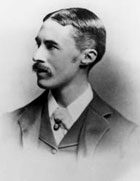Here Dead We Lie Poem by Alfred Edward Housman
Here Dead We Lie
Here dead we lie
Because we did not choose
To live and shame the land
From which we sprung.
Life, to be sure,
Is nothing much to lose,
But young men think it is,
And we were young.
In my own candid opinion, i'd say this is a great poem, two stanzas and explcit. In the first stanza he trys to tell us what it means to die with dignity, to die fighting with little hope for a cause.he prefares to die than 'shame the land' from which he sprung.this is real patriotism in the second stanza housman tries to explain a young man's view of life. Youth is a stage where young men think less before action...most times in the eyes of an exuberent youth, life is seen as 'nothing much to loose.. This is so true(have you withnessed university students on rampage before?) its never right to rate a poem low when you've not understood the subject matter from the writer's viewpoint.
Few poems as short as this have caused as much controversy As Here Dead We Lie. Many attempts have beeen made to re-interpret it in the light of more 'modern' views of war but I think Houseman is indeed saying that it is preferable to accept the risk of death than the shame of cowardice and that the life of the individual is less significant than that of the good of the whole. This last position begs of course a huge question - how is the good of the whole determined? By the powers that be? Houseman could at times be quite depressive and there does seem to be a kind of death wish here. I don't see this as one of his better poems.
Outstanding poetry. The young soldiers preferred to die in the battle field than to bring disgrace to their country. They didn't want to come to their own country as losers. Excellent poem!
I like this. Either the speaker is the shade of a WW1 soldier or, since the dead no longer speak for themselves, the poem is a parody of war epitaphs. The dead speaker, from his perspective of eternity, would know life was a great deal to lose after all (especially since he was young) , and is speaking ironically. Or perhaps they are the words of a government-commissioned poet on the side of a tomb; but then the soldiers are made into liars, glorifying what killed them: 'Here dead we lie'.
He speaks for the young men who died in war and regretted losing their lives because they were young 'Life, to be sure, Is nothing much to lose, But young men think it is', . He is right about this.
This poem does not signify a dignified end but rather the saddening truth in which the ignorant members of the Army, the men who were no different from us, had to face.
This poem has not been translated into any other language yet.
I would like to translate this poem
This is second-rate poetry. The first line contains an unnecessary inversion – why not “Here we lie dead/Because…” Also in the first line: “here” and “lie” could be left out (we know the dead “lie” and we know they must lie somewhere, and where else do they “lie” if not “here”? 'We are dead because...' could have been the first line. The “to be sure” is smug – and there is nothing “sure” about life being nothing much to lose (Housman here tries to make his own jaundiced view of life a universal belief.) . Nor is it sure that young men think life is nothing much to lose.. Housman ignores all the positive reasons for which young men fought in WWI (and there were many) for the negative one of not wanting to 'live and shame the land...'.